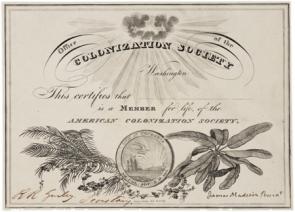I left from here when I was a young man, but most people thought that was the best thing to do then. But I say to you now, don't run and do fight. Fight white and black for all of this place. You got black people here saying go back to Africa, some saying go to Canada, some saying go to France. Now, who munks y'all sitting here right now want be a Frenchman and talk like they do? Let me see his hand in the air. (115)This short section of Ned's speech down by the river, around 1900, contains a few layers that need to peeled off. When I read this paragraph, I cannot help but think about Gaines's move to California then his subsequent trips back to Louisiana. I also think about his planned trip to Mexico is 1962 with his friends to escape the materialism and racism in the United States. After seeing James Meredith's strength in integrating the University of Mississippi in September 1962, Gaines decided to stay, and not run.
Culturally, the twentieth century saw African American writers emigrating to Europe and elsewhere, specifically Richard Wright, Chester Himes, and James Baldwin. While Baldwin returned periodically and had a presences in the Civil Rights Movement, he never the less resided in Europe and died there. To Ned, running away from the problem is tantamount to cowardice. One must stand and fight in order to see any change occur. I am not saying that Wright, Himes, and Baldwin should be considered cowards. As I said, Baldwin intellectually put himself in the fight.
 |
| American Colonization SocietyCertificate (1833) |
John B. Russwurm, one of the editors of the first African American newspaper Freedom's Journal, initially opposed the plan. However, neat the end of the newspaper's two year run, his opinion changed. In fact, Russwurm emigrated to Liberia in the mid-1830s and became a governor there until his death in 1851. In a March 14, 1829, article in Freedom's Journal, Russwurm writes,
The subject of Colonization is certainly important, as having a great bearing of that of slavery: for it must be evident that the universal emancipation so ardently desired by us & all our friends, can never take place, unless some door is opened whereby the emancipated may be removed as fast as they drop their galling chains, to some other lands besides the free states; for it is a fact, that prejudices now in our part of the country, are so high, that it is often the remark of liberal men from the south, that their free people are treated better than we are, in the boasted free states of the north. If the free states have passed no laws as yet forbidding the emigration of free persons of color into their limits; it is no reason that they will not, as soon as they find themselves a little more burdened. (207)Since free African Americans received derogatory treatment even though they did not live in the bondage of slavery, Russwurm argues that they should consider leaving for Africa. There, they could grow and become educated apart from the oppression that daily tormented them in the United States, north and south. Russwurm's turn drew ire from those who felt that emigration to Liberia should not occur.
 |
| American Colonization Society Coin (1833) |
Ned, in The Autobiography of Miss Jane Pittman, echoes these same sentiments in his speech down by the river. He tells his audience that they must not be cowards and that they must fight. Ned reinforces the thought, too, that his audience should not leave because the earth is theirs. He tells them that men cannot own the earth, but he gives them pride by stating that the land is theirs because the bones of their ancestors reside there and the ancestors "sweat and their blood done drenched this earth" that they plowed and cultivated (112). America, and the specific land in Ned's speech, belongs to them because of the work they did and the lives they loved there. No one can take that away.
This is just a brief discussion of the colonization movement, and its early beginnings. For more, follow the links above in the post. What other American literature texts, in the 19th century, can you think of that focus on colonization or on representations of Africa? Let me know in the comments below.
Gaines, Ernest J. The Autobiography of Miss Jane Pittman. New York: Bantam Books, 1972. Print.
James,
Winston. The Struggles of John Brown
Russwurm: The Life and Writings of a Pan-Africanist
Pioneer, 1799-1851.
New York: New York University Press, 2010. Print.
Walker,
David. Appeal, in Four Articles; Together
with a Preamble, to the Coloured Citizens of the World, butin Particular, and Very Expressly, to those of the United States of America. 3rd
edition. Boston: David Walker, 1830. Print.
No comments:
Post a Comment